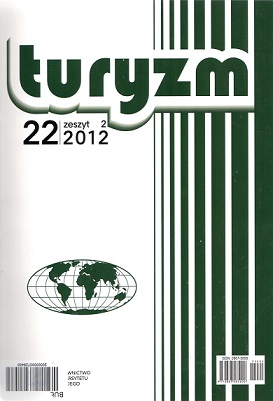Lomonosov Moscow State University: the major centre for Russian research and education into tourism and recreation
DOI:
https://doi.org/10.2478/v10106-012-0006-zKeywords:
Lomonosov Moscow State University, research, recreation system, recreation economy, polarized landscapeAbstract
The author discusses the tourism geography research which has been undertaken at Lomonosov State University in Moscow over many years. This academic institution is one of the most famous research centres dealing with spatial recreation systems. At first (from the 1960’s), research was mainly on geographical and technical issues, but the research area was gradually enlarged for example to include social and humanistic elements. The best known research has been done on ‘spatial recreation systems’, ‘polarized landscapes’, the ‘recreational economy spatial complex’, and the ‘environmental model of a spatial system’.
Downloads
References
ALEKSANDROVA A.Y., 2002, Структура туристского рынка [Tourism Market Structure], Press-Solo, Moscow, 384 ss.
Google Scholar
ALEKSANDROVA A.Y., 2007a, Кластеры в мировой индустрии туризма, [Clusters in World Tourism Industry], Vestnik MSU, ser. 6, „Economy”, 5, s.43–62.
Google Scholar
ALEKSANDROVA A.Y., 2007b, Tourism Clustering in Russia and Abroad, Tourism/Turyzm, 17/1–2, s. 19–42.
Google Scholar
ALEKSANDROVA A.Y. (ed.), 2008, 2009, 2010 (3 editions), Гео- графия туризма [Tourism Geography] KNORUS, Moscow, 592 ss.
Google Scholar
KOZLOV V.N., FILIPPOVICH L.S., CHALAYA I.P. and others, 1990, Рекреационные ресурсы СССР: Проблемы рационального использования [Recreational Resources of the USSR. The Problems of Rational Exploitation], Наука, Moscow, 168 ss.
Google Scholar
KRUZHALIN V.I., 2009, Туристско-рекреационные кластеры – новые стратегии развития регионального туризма [Clusters in Tourism and Recreation as a New Strategy for Regional Tourism Development], Kurortnoje delo, turism i recreatsia, 3, 4 (12), s. 29–32.
Google Scholar
MIRONENKO N.S., BOCHVAROV M. (eds.), 1986, Рекреационные систем [Recreational Systems], MSU Publishers, Moscow, 136 ss.
Google Scholar
MIRONENKO N.S., ELDAROV E.M., 1998, Гуманитарные аспекты исследования рекреационных систем [Human Aspects or Recreational Systems Study], Vestnik MSU, ser. 5, „Geography”, 1, s. 22–27.
Google Scholar
MIRONENKO N.S., TWERDOKHLEBOW I.T., 1981, Рекреационная география [Recreational Geography], MSU Publishers, Moscow, 207 ss.
Google Scholar
PREOBRAZHENSKY V.S. (ed.), 1975, Теоретические основы рекреа- ционной географии [Recreational Geography Theoretical Foundations], Наука, Moscow, 224 ss.
Google Scholar
PREOBRAZHNSKY V.S, KRIWISHEEV V.M. (eds), 1980, Geography of Recreational Systems in the USSR, Наука, Moscow, 250 ss.
Google Scholar
RODOMAN B.B., 1974, Поляризация ландшафта как средство сохранения биосферы и рекреационных ресурсов [Landscape Polarization as a Means of Biosphere and Recreational Resources Conservation], [in:] Ресурсы, среда, расселение [Resources, Environment, Settlement], Наука, Moscow, s. 150 –162.
Google Scholar
SADOVNICHY V.A., 2005, Первому университету страны – 250! [250 Years of the First National University], Наука и жизнь [„Science and Life”], 1, s. 2–15.
Google Scholar
Территориальная организация отдыха населения Москвы и Мос- ковской области [Spatial Organization of Recreation for Moscow and Moscow Region Population], 1986, Наука, Moscow, 176 ss.
Google Scholar
VEDENIN Y.A., ZORIN I.V. (eds), 1989, Теоретические проблемы рекреационной географии [Recreational Geography Theoretical Foundations], Moscow, 184 ss.
Google Scholar
Downloads
Published
How to Cite
Issue
Section
License

This work is licensed under a Creative Commons Attribution-NonCommercial-NoDerivatives 4.0 International License.










